by Meray Maddah
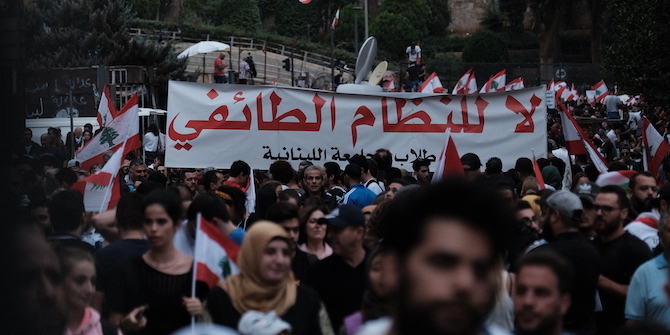
Lebanon and its population have had several turbulent years, which reached a pinnacle during the 17 October protest movement in 2019. Optimism was at an all-time high when protests challenged the country’s confessional system and its lifelong executives. New faces emerged in the Lebanese political scene and provided an outlet for those who had been long left unheard. Shortly thereafter, several emerging political movements (EPMs) organised on the basis of common objectives, challenging the ethnosectarian system. The country’s elites only seemed to be interested in sustaining their power and holding onto their lucrative status. Lebanon’s decaying post-war political order created a sectarian bedrock that elites use to their advantage. It remains to be seen whether these EPMs can defy this artifice and try to pave a new road ahead.
Parliamentary and municipal elections are set for May 2022, although a delay is possible given the crises the country faces. These elections signal some hope for a population that is suffering on all fronts, but the laws regulating them are controlled by elites intent on remaining in power. An adequate electoral law, departing from the current proportional set-up but representative of the country’s demographics, is yet to be discussed by parliament. Given the power that these elites have and their intention to hold onto it, it is in their interest to delay the elections and try to reconfigure their fragile relationship with their constituents. Attempts have been made by providing food baskets, medication and fuel vouchers as a response to the economic crisis. A concerning point is that such moves marginalise the state’s role further and amplifies partisan lines across the population.
Many of the leading figures within the EPMs were already active ahead of the 2018 elections, specifically when the Kullouna Watani coalition fielded sixty-six independent candidates in nine districts across Lebanon. Some EPMs are already setting the wheels in motion in preparation for next year’s elections. The upcoming election’s significance is also marked by the end of the current tenure of President Michel Aoun, whose lifelong designs upon the presidency materialised after a two-year power vacuum during which the country had no president. Dismantling the sectarian system is a general theme and goal that the EPMs embody, yet each group adopts its own socioeconomic and political strategy. There are several points that EPMs have in common; however, the question remains whether this is enough to compete with the established elites. If so, how can this be achieved?
Who are they? Between Past and Present
Several previous movements were catalysts for change as a result of their demands, like 2011’s protests aimed at overthrowing the sectarian system; 2013’s anti-parliamentary term extension rallies and 2015’s waste crisis movement. Yet, the 17 October movement is seen as more organised than its predecessors. The EPMs were galvanised after the Beirut blast which saw the resignation of then Prime Minister Hassan Diab. There are also civic organisations, like Kulluna Irada, that describes itself as a political platform to empower independent groups and raise awareness on public issues.
These EPMs encompass common objectives, yet their choice of political organising differs. Lihaqqi (for my right) is a grassroots collective whose mission centres around economic equality and social justice through participatory methods. It prioritises local politics through neighbourhood organising and focuses on local councils. Lihaqqi’s level of local engagement underscores the importance of community organising. Another example is Minteshreen (scattered/from October), a youth-led movement that claims the inheritance of the 17 October uprising. The centrist Minteshreen agitates for a civil state governed by the rule of law, which would provide a social safety net for all without discrimination. However, unlike Lihaqqi, it focuses on the diaspora where social media is used to increase outreach. Ideologically, Minteshreen leans towards welfare capitalism, while supporting the restructuring of public debt and the banking sector.
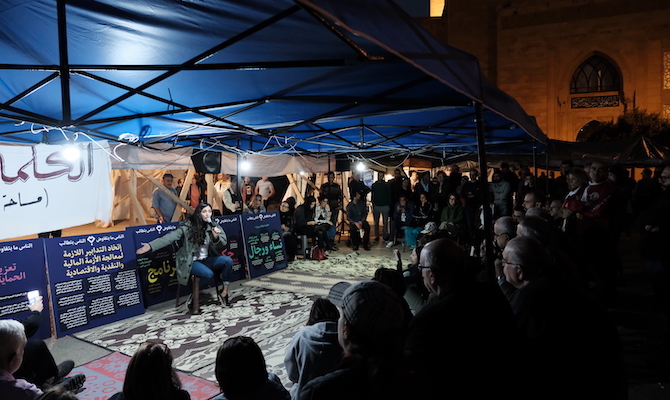
Vague Coalitions
After the Beirut port explosion on 4 August 2020, three legislators from the al-Kataeb Party resigned from parliament in protest of the government’s mishandling of the tragedy’s aftermath. Al-Kataeb, now rebranded as the Lebanese Social Democratic Party, is a centre-right Christian party established during the French mandate in 1936. It allied with several EPMs in an opposition political front to provide an alternative model to consociationalism, rejecting the quota system and introducing economic and political reforms. An established party aligning with EPMs in the same front may pose issues of credibility for a prospective opposition. Al-Kataeb’s association with EPMs is a non-zero sum game where these groups stand to gain exposure, while the party puts itself forward as a genuine opposition. Still, Minteshreen has stressed that there needs to be dialogue with established parties since they retain large swaths of popular support.
Currently, the parliament is missing ten lawmakers: eight members resigned after the explosion and two others died from COVID-19 complications. The constitution’s Article 41 states that by-elections should be held to replace the seats within two months of the vacancy, but now months have passed with no by-elections in sight. Between a pandemic that exacerbated the economic crisis and a new government installed after a thirteen-month political deadlock, next year’s elections are a testing ground for EPMs. It is projected that these groups will gain seats in either parliamentary or municipal elections. What remains to be seen is how many seats and what political power could be garnered in this way. Minteshreen are aiming for at least 10 parliament seats to make a difference – anything less would mean proposing legislation would require coalition deals with other parties, to which EPMs are vehemently opposed.
Whether EPMs choose to organise separately and then assemble in a common coalition, or if some ally with national parties, confessionalism is engrained in Lebanon’s system. Under this system, electoral laws empower sectarian divides and undermine peace and harmony among confessional groups. This begs the question of how fundamental change can be implemented: do EPMs become part of the system and try to change it from within, or should the system be eliminated before engagement? The upcoming elections will not provide the ultimate answer to this question, but both strategies are likely to be used. Meanwhile, it must be remembered that even with breakthroughs for opposition candidates, a change to Lebanon’s political system would still need more than one electoral cycle.
Conclusion
A worsening fuel crisis and electricity shortages plague a population with ‘no clear turning point on the horizon’ for the country’s economic woes. Meanwhile, EPMs face partisan votes, contested electoral laws and elites that have held power for decades. Elections remain difficult to impact given the challenges in overcoming sectarian burdens that influence voting behaviour and can be co-opted by elites to mobilise their respective sects. For this reason, these EPMs need to run on organised platforms with a clear strategy that competes with the establishment parties’ populism. Assuming that the incumbents will not easily relinquish power, even when somewhat transparent elections are held, EPMs need to be prepared for the sectarian patron-state argument that elites will trigger among their bases. Decentralised mobilisation and local dialogue forums need to be held with voters, especially in Lebanese regions where a particular sect is dominant. If EPMs choose a pragmatist and post-ideological discourse, then it will not be enough to compete with established parties eager to play the sectarian card and acquire votes using this political sensitivity. Focusing on governance issues affecting day-to-day lives and organising towards municipal elections, for now, may be a bolstering step ahead of parliamentary elections. Expectations for these nascent movements should be managed in a confessional system like Lebanon’s. The road to a political change is full of obstacles, but the movement does now seem to be more organised than ever before.



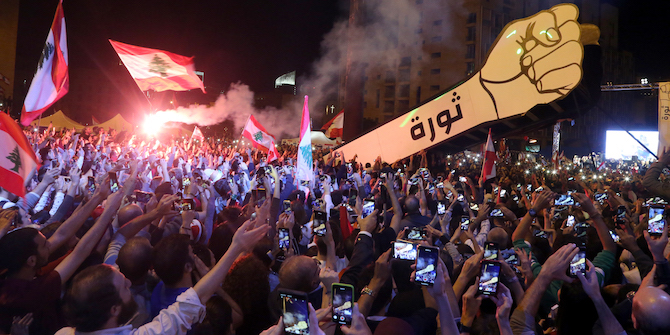
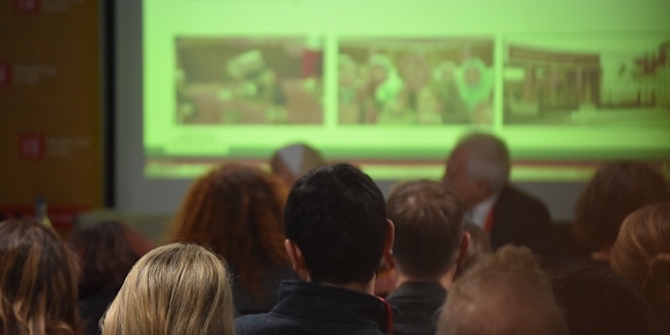

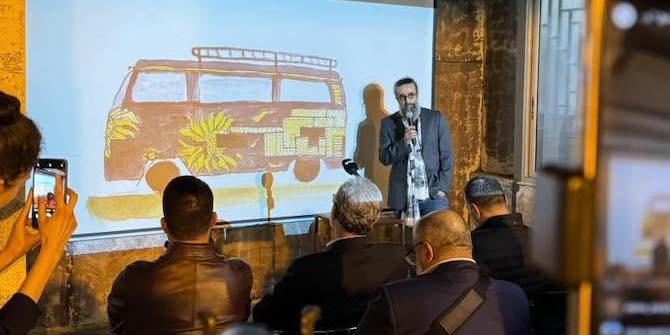
5 Comments